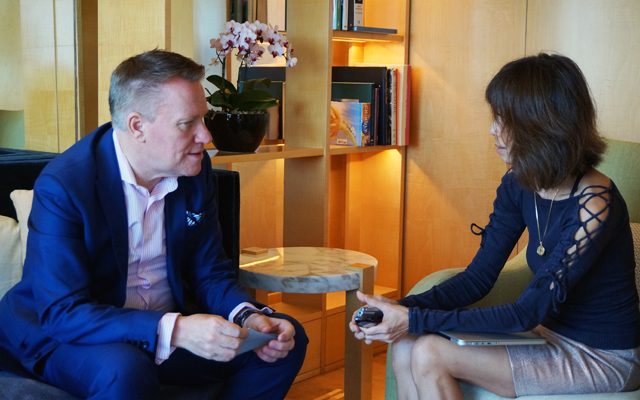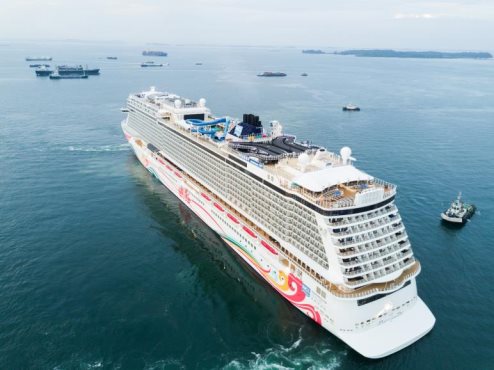
Norwegian Cruise Line Holdings’ (NCLH) announcement to pull out its China-centric ship, Norwegian Joy, from China to the US appears to have taken its Asia-Pacific team off-guard, and raises a question mark about its exclusive partnership with Alibaba.
The cruise company last week announced it would redeploy Norwegian Joy from its homeport in Shanghai to Seattle from April 2019 for Alaskan voyages and to Los Angeles in winter 2019/2020 for Mexican Riviera and Panama Canal voyages.
Instead of homeporting, it will operate in China seasonally with Norwegian Spirit from summer 2020. The ship, which will undergo a Norwegian Edge refurbishment, will serve China in the peak summer months and Australasia in the other season.

NCLH said it was monetising strong global demand and driving higher returns for shareholders. In other words, the rest of the world is bringing greater revenues than China and it is “right-sizing” its capacity based on current market conditions globally.
The domino effect of redeploying Norwegian Joy enables the line to move Norwegian Pearl to Europe, increasing to six the number of ships there; frees Norwegian Jewel to return to Australia/New Zealand for a third season; and sends Norwegian Jade for additional capacity in South-east Asia.
NCLH’s senior vice president & managing director Asia-Pacific (including China), Steve Odell, plays down the impact of a year of hiatus in China, when Norwegian Joy leaves in March 2019 and Norwegian Spirit enters in summer 2020, even though in an interview in May at ILTM Asia Pacific in Singapore he was gung-ho about China directions, including marketing plans to increase yields for Norwegian Joy in China and deepening the partnership with Alibaba.
He even said there was talk of having a second ship, Norwegian Encore, in China, but a decision was made to send it to the Caribbean. “We think we can earn better returns (for Norwegian Encore) in one of the Western markets. Demand is high in North America and the rest of the world,” Odell had said.
Little did he realise that Norwegian Joy would also go, ignoring a question in an email interview yesterday if he was surprised by the announcement.

But in the earlier interview, Odell did allude to challenges with the China market. Norwegian Joy, which celebrated its first anniversary in China on June 27, exceeded expectations, with Odell claiming it mostly sailed with 4,300 to 4,400 pax. The problem was the yield.
Norwegian Joy currently is selling at around US$700 to US$1,000 for four days and depends on onboard spending on everything from dining to shopping to spike revenues. But typically in China it has to work with large agents on a ‘commit’ basis of half charters or full charters, which means it has less control over the customers, isn’t able to interact with them, or decide what the discount or promotion should be.
As such, it has been trying hard to widen the distribution and work with smaller agents and go B2C, but the latter is particularly difficult due to rules and regulations.
That hasn’t stopped it from trying. In February, for example, it launched a Joy at Sea programme offering a number of value-adds as part of the fare, the most important being free WeChat if the clients follow the ship.
“So for every cruise, we’re collecting 4,400 WeChat followers. Getting accurate information of the customers in order to re-market, or push sales on board, is critical. It’s been challenging in China but the free WeChat has really helped to grow our database quickly. We have much more of a voice today,” Odell told TTG Asia in the May interview.
Alibaba’s partnership is also critical for NCL’s B2C drive. In turn, Alibaba not only sees opportunities in premium cruise sales per se with NCL, but also pushing online promotions such as shopping on board, dining, entertainment and gambling.
In the first year, the initiatives were more marketing-driven than sales-driven, more about positioning NCL and Alibaba in the cruise market, according to Odell. “We have on-going discussions with them on consumer information and how we can target the right customers through their databases to grow the partnership,” he had said in May. “It’s obviously a brand we would like to be associated with, and they want to be associated with us.”
When asked on Monday what would happen to the partnership given the redeployment, Odell said: “We have a good relationship with Alibaba based on the work we have already done with them and we will re-engage with Alibaba when Norwegian Sprit deploys to the region in 2020.”
At press time, TTG Asia was unable to reach Alibaba for comment.
Odell said NCLH would maintain its current operation in through March 2019, with Alex Xiang continuing as managing director leading its offices in Shanghai and Beijing. “We will naturally reduce manning based on a smaller operation in 2019 and the future, but as we are working through this I cannot share specifics at this stage,” he said.
In the interim, NCLH will expand its activity in “the burgeoning fly-cruise market” in China as well as launch early sales for the 2020 homeport season, he added.



















